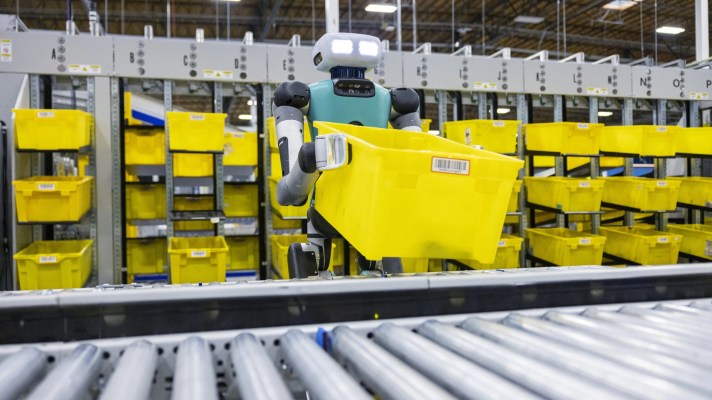At today’s Delivering the Future event, Amazon announced that it will begin testing Agility’s bipedal robot Digit in its facilities. Amazon Robotics Chief Technologist Tye Brady said the testing is in its “very, very early stages,” adding, “We’re taking a lot of care to understand it better and see if there’s a fit for our processes.”
Reading between the lines here, there’s no guarantee that Amazon will actually begin deploying Digit to its warehouse facilities, which currently utilize north of 750,000 robot systems.
The exploration isn’t a big surprise. Last April, the retail giant announced a $1 billion “Industrial Innovation” fund. Agility was one of an initial round of five firms receiving a cut of that investment. The list also includes Mantis Robotics, Modjoul and Vimaan.
Amazon has long insisted that its investment in these companies doesn’t point to any broader integrations with the technologies, but the company has often used these sorts of funds to explore partnerships and even acquisitions.
Agility is one of a number of startups building bipedal/humanoid robots for warehouse work. The theory posits that humans build workplaces around ourselves, so why not build robots that can operate in those spaces. Agility is, however, well ahead of the competition here in terms of development and production.

Image Credits: Amazon
“Digit can move, grasp, and handle items in spaces and corners of warehouses in novel ways,” Amazon writes. “Its size and shape are well suited for buildings that are designed for humans, and we believe that there is a big opportunity to scale a mobile manipulator solution, such as Digit, which can work collaboratively with employees. Our initial use for this technology will be to help employees with tote recycling, a highly repetitive process of picking up and moving empty totes once inventory has been completely picked out of them.”
In September, the company announced that it is ramping up production in a serious way with the addition of RoboFab, a factory located in Salem, Oregon that it says will be capable of churning out more than 10,000 robots a year when fully operational.
